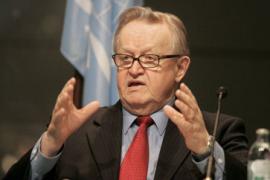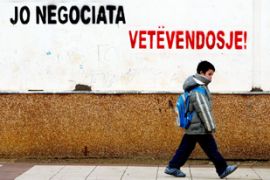Thursday’s meeting in Vienna was prompted by continued Russian opposition to a plan for internationally supervised independence proposed by Martti Ahtisaari, UN envoy.
Leaders of Kosovo’s 90 per cent ethnic Albanian majority said they were urging Serbia to accept independence and look forward, to a future of friendly relations between two sovereign states.
“We have the opportunity to lay the foundations for a mature, stable functioning relationship between independent neighbours,” Agim Ceku, Kosovo’s prime minister, said.
Consequences
But there seems little chance that Belgrade will ever accept such a relationship.
“If someone causes damage to you, then you, in accordance
with the circumstances and situation, have to hit back”
Vojislav Kostunica, Serbian Prime Minister |
Earlier on Thursday, Vojislav Kostunica, Serbian prime minister, had warned of consequences if the international community allowed Kosovo to unilaterally proclaim independence.
“If someone causes damage to you, then you, in accordance with the circumstances and situation, have to hit back,” he said.
“That is the way to preserve your own integrity and something that represents the dignity of the state.”
Slobodan Samardzic, Serbia’s minister for Kosovo, said at the meeting in Vienna that Belgrade’s counter-offer of autonomy would give Kosovo “more powers than it ever had in its history”.
Thursday’s talks had been organised by the Contact Group, which includes the US, Britain, France, Germany, Italy and Russia.
Negotiations
Serbs and Albanians had held talks for 13 months until March this year, when Martti Ahtisaari, UN mediator on Kosovo, called a halt to negotiations.
He said agreement on the issue was impossible and presented his draft plan for supervised independence to the UN.
Russia has maintained its support for Belgrade’s position on Kosovo, effectively blocking Ahtisaari’s plan at the Security Council.
The West hopes to wrap talks up by December 10, when a mediating “troika” of representatives from Russia, the US and the EU reports back to the UN.
However, Russia has rejected the deadline.
EU divided
Kosovo’s ethnic Albanian majority became an underclass in Serbia during the 1990s, during the rule of Slobodan Milosevic.
 |
A plan by Martti Ahtisaari on Kosovo’s future
has been rejected by Serbia and Russia [EPA] |
Albanian separatist fighters eventually led an armed campaign against Milosevic’s government, provoking a violent crackdown by Belgrade.
A Nato bombing campaign forced Serbian troops to withdraw from Kosovo. The UN has run the province since 1999.
Serbia says granting independence would violate international law, while Albanians say they will not remain part of a country that tried to wipe them out.
Ceku said that after December 10 “we will try to co-ordinate the declaration of independence and we will move toward recognition” regardless of a UN resolution.
Such a move would almost certainly split the 27-member EU, which does not have a united line on Kosovo.

